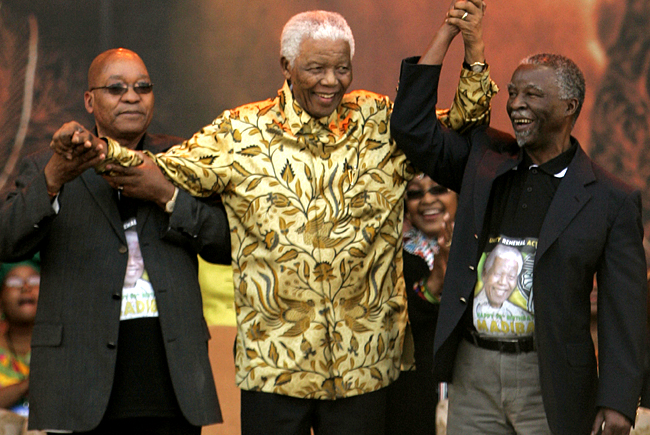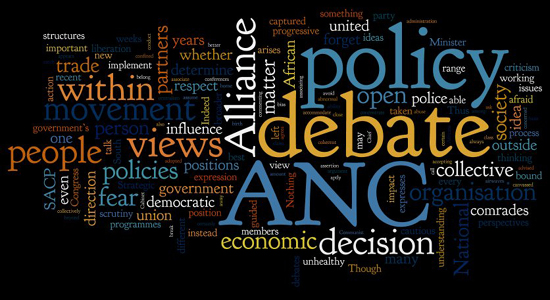Politics
ANALYSIS: Mbeki 2007 vs Zuma 2009: a study in contrasts

Late in October 2009, President Jacob Zuma published a letter to the nation discussing the topic of internal debate in the ANC. Two years ago, former President Thabo Mbeki published a letter discussing the topic of internal debate in the ANC. They are a classic study in contrasts.
Of course, the letters were written at different times, in different situations. Mbeki’s letter is an attempt (in vain as it turned out) to combat the impression that his speeches mentioning “tribalism” were coded messages in the battle for party leadership against Zuma.
Zuma’s letter constitutes an attempt to draw a line under the notion that rifts are developing within the ANC over economic direction.
What they have in common are attempts to debunk the blindingly obvious; in Mbeki’s case that a contest for leadership was underway and in Zuma’s case that there is a contest over economic direction. Both appeal to ANC traditions in order to claim that these “impressions” or “interpretations” are in fact misunderstandings.
Yet beyond the immediate issues of their times, they constitute good examples of extraordinary differences in approach.
Mbeki’s letter, for example, proceeds from the point of view that anyone who does not see things his way is simply deluded. He actually uses the description “so-called leadership struggle”.
Figure 1: Mbeki’s word-cloud

Presumably he would choose to describe it differently, but that there was a leadership contest was at the time absolutely beyond debate, as Mbeki surely knew – since he had announced his intention to contest the post. Yet nowhere in the speech does Mbeki even slightly concede that something of that nature might just possibly be going on in the background.
The focus is entirely on people’s misunderstanding of him and what he said. Hence, he spends much of the letter quoting himself, in an effort to demonstrate what he actually meant and how wrong people were in interpreting him wrongly. He also spends large amounts of space quoting the Sunday Independent, to demonstrate what other people think wrongly about him.
The impression created is of someone acting in blithe indifference to the issue of the day. Worse in fact; he positively confused that anyone should suspect that he might be concerned with the issue at all.
Zuma’s approach was almost exactly the opposite: he focused immediately on the issue of the day, but sought to interpret it differently. Instead of staunch denial the approach is subtle reinterpretation.
Hence, while for Mbeki the leadership contest was forcibly removed into the background, in Zuma’s letter the struggle over economic direction is attacked head-on. The tone is less censorious, less personal, and more a genuine attempt to convince than a bare assertion.
Zuma engages in conversation; Mbeki in declaration. Although frustrating and annoying, the big advantage Mbeki had in adopting this approach during his presidency was that he could be bound by nothing.
Figure 2: Zuma’s word-cloud

For Zuma, engaging in debate and supporting the notion of debate is to encourage it, and Zuma risks by adopting this approach an ongoing war of interdepartmental attrition right through his term of office.
Parsing the two speeches for often repeated words produces two word clouds (a rather neat way to graphically illustrate such things) where “ANC” comes across clearly as the dominant theme in both cases. The words “policy” and “movement” are respectively the second most used words, but perhaps they should be discarded since these were both the topics under discussion.
The key word is perhaps “people”, far more dominant in the Zuma speech than in the Mbeki speech, and “leadership” which appears in the Mbeki speech, but not at all in the Zuma speech.
An infallible guide? Perhaps not, but indicative, certainly.
By Tim Cohen
Read more: Mbeki’s letter, Zuma’s letter
Photo: Former South African president, Nelson Mandela (C) smiles as he arrives with African National Congress (ANC) president Jacob Zuma (L) and South Africa’s president Thabo Mbeki at the Loftus stadium in Pretoria during an rally organised by the ANC to celebrate Nelson Mandela’s 90th birthday August 2, 2008. REUTERS/Siphiwe Sibeko





 Become an Insider
Become an Insider